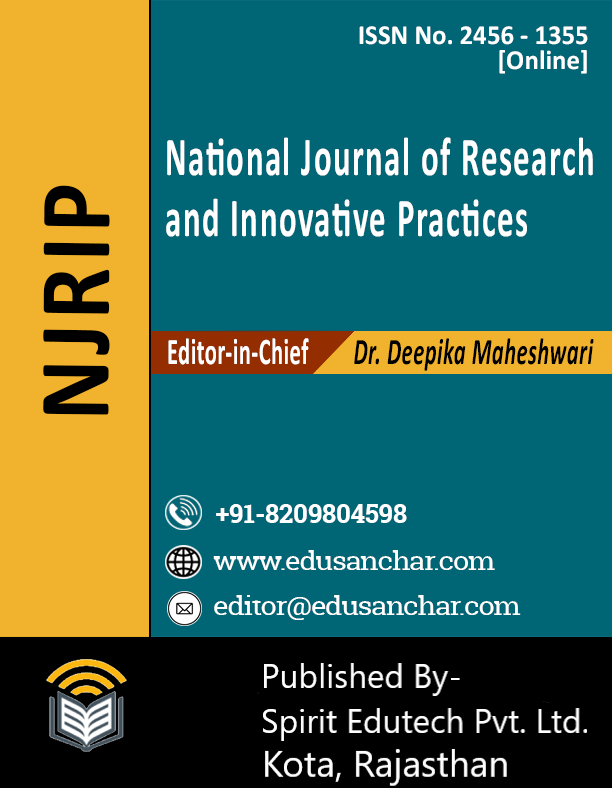
Play Therapy as a Tool for Enhancing Social Skills in Children with Disabilities: A Review
Author Name :- Kishan Lal Bairwa,Dr. Vijendra Mishra,
Journal type:- NJRIP-National Journal of Research and Innovative Practices
Research Field Area :- Department of Education ; Volume 10, Issue 8, No. of Pages: 11
Your Research Paper Id :- 2025010405
Download Published File :- Click here
Abstraction :-
Keywords :-
play therapy, social skills,children with disabilities, autism spectrum disorder, intellectual disability, specific learning disabilities, child-centered play therapy LEGO-based therapy, group play therapy, social communication
References :-
Abid, N., Elloumi, S., & Mellouli, M. (2024). Effectiveness of a training program among parents of children with autism spectrum disorder (ASD): A randomized controlled trial. Humanities and Social Sciences Communications, 11, Article 473. https://doi.org/10.1057/s41599-024-02827-7
Angelìs, L. O., et al. (2024). LEGO®-based therapy in school settings for social behavior and mental health in children with ASD. Brains, 14(11), 1114. https://doi.org/10.3390/brains14111114
Asjad, S., & Naqvi, I. (2017). Effectiveness of play therapy in management of autism spectrum disorder. Rawal Medical Journal, 42(2), 223–226.
Barghi, F., & Amini, M. (2023). Effectiveness of DIR/Floortime play therapy on social skills and emotion regulation of children with ASD. Middle East Journal of Rehabilitation and Health Studies, 10(4), e138491. https://doi.org/10.5812/mejrh-138491
Bent, C. A., et al. (2022). Common and specific factors in manualized play-based interventions for autistic children: A narrative review. Journal of Autism and Developmental Disorders, 52(12), 5161–5180. https://doi.org/10.1007/s10803-021-05333-7
Chan, K. L. R., et al. (2024). Impact of child-centered play therapy on autistic children: Behavioral and neurophysiological outcomes. Infant Behavior and Development, 67, 101852. https://doi.org/10.1016/j.infbeh.2024.101852
Choy, S. W., & Lee, H. (2024). To fill the gap: A systematic literature review of group play programs for children with autism. Analytrics Journal, 3(2), 1–18.
Divya, K. Y., et al. (2023). DIR/Floortime in engaging autism: A systematic review. Indian Journal of Psychiatry, 65(Suppl. 2), S300–S311. https://doi.org/10.4103/indianjpsychiatry.indianjpsychiatry_405_22
Gibson, J. L., Pritchard, E., & de Lemos, C. (2021). Play-based interventions to support social and communication development in autistic children aged 2–8 years: A scoping review. Autism, 25(8), 2266–2287. https://doi.org/10.1177/13623613211024373
Gupta, D., & Sinha, R. (2023). Play therapy for children with autism spectrum disorder: A case report. Indian Journal of Mental Health, 10(2), 167–171.
Humble, J. J., et al. (2018). Child-centered play therapy for youths who have experienced trauma. Children, 5(3), 40. https://doi.org/10.3390/children5030040
Jacob, U. S., et al. (2022). Strategies for enhancing social skills of individuals with intellectual disability: A systematic review. Frontiers in Rehabilitation Sciences, 3, 968314. https://doi.org/10.3389/fresc.2022.968314
Kascsak, T. M. (2012). The impact of child-centered group play therapy on social skills for kindergarten children (Doctoral dissertation, UNC Charlotte). (Included for background on CCPT group processes.)
Koh, S. H., et al. (2024). Physical exercise interventions and social skills in children with ASD: A meta-analysis. Frontiers in Psychology, 15, 1399902. https://doi.org/10.3389/fpsyg.2024.1399902
Lindsay, S., et al. (2017). A scoping review of the role of LEGO® therapy for improving social communication in autism. Autism, 21(6), 634–650. https://doi.org/10.1177/1362361316675315
Mirahmadi, Z., et al. (2016). The effectiveness of group play therapy on social skills of students with intellectual disability. Physical Treatments, 6(3), 153–160.
O’Keeffe, F. S., et al. (2023). I-SOCIALISE: Cluster randomized controlled trial of LEGO®-based therapy in schools for autistic children. BMJ Open, 13(10), e030471. https://doi.org/10.1136/bmjopen-2019-030471
Parker, M. M., et al. (2021). Exploring the impact of child-centered play therapy on social, emotional, and academic outcomes: A meta-analytic review. Evidence-Based Child Therapy Review, 8(1), 1–22.
Rautenbach, G., et al. (2025). Play-based occupational therapy and social participation in autistic children: A randomized trial. Journal of Occupational Therapy, Schools, & Early Intervention, 18(1), 45–62. https://doi.org/10.1080/19411243.2024.2360414
Ray, D. C., & Landreth, G. L. (2015). Child-centered play therapy in schools: Review and meta-analysis. Psychology in the Schools, 52(2), 107–123.
Wright, B., et al. (2023). I-SOCIALISE: Cluster randomized controlled trial investigating LEGO®-based therapy in schools. Autism, 27(1), 161–173.
Xu, T., & colleagues. (2025). Parent–child play therapy for improving reading performance in students with specific learning disabilities: Evidence from BMC Psychology. BMC Psychology, 13, Article 2436.
(Additional programmatic/definition sources for play therapy principles and best practices may include: Association for Play Therapy (A4PT) definitions and best practice statements; Learn to Play Therapy implementation guidance; and evidence summaries from recognized professional bodies.)
Corbett, B. A., et al. (2023). A peer-mediated, theatre-based intervention improves social competence in autistic youth: Randomized controlled trial. Journal of Autism and Developmental Disorders, 53, 4365–4380. https://doi.org/10.1007/s10803-022-05802-5
Gibson, J. L., Pritchard, E., & de Lemos, C. (2021). Play-based interventions to support social and communication development in autistic children aged 2–8 years: A scoping review. Autism, 25(8), 2266–2287. https://doi.org/10.1177/13623613211024373
Association for Play Therapy. (n.d.). Why play therapy? https://www.a4pt.org/page/WhyPlayTherapy
Humble, J. J., et al. (2018). Child-centered play therapy for youths who have experienced trauma. Children, 5(3), 40. https://doi.org/10.3390/children5030040
Asjad, S., & Naqvi, I. (2017). Effectiveness of play therapy in management of autism spectrum disorder. Rawal Medical Journal, 42(2), 223–226.
Divya, K. Y., et al. (2023). DIR/Floortime in engaging autism: A systematic review. Indian Journal of Psychiatry, 65(Suppl. 2), S300–S311. https://doi.org/10.4103/indianjpsychiatry.indianjpsychiatry_405_22


